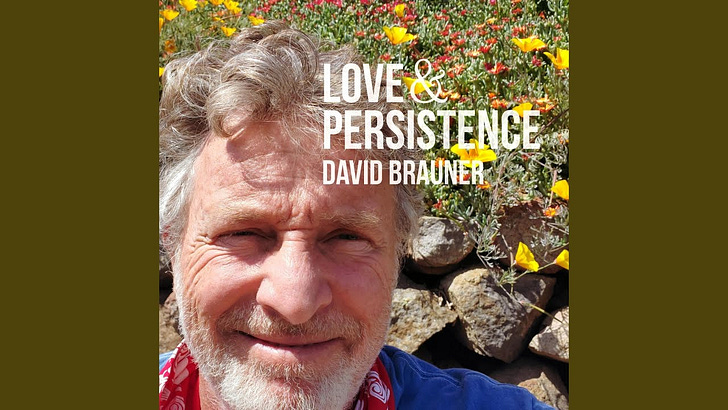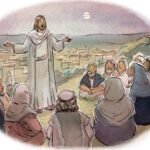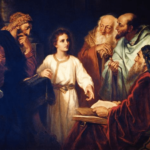[ad_1]
In Bible study the other evening, we came across the famous passage on “loving our enemies” and “turning the other cheek.” These are the words of Jesus from Luke 6: “But to you who are listening I say: Love your enemies, do good to those who hate you, bless those who curse you, pray for those who mistreat you. If someone slaps you on one cheek, turn to them the other also. If someone takes your coat, do not withhold your shirt from them.”
Some in the group found it nearly inconceivable to pray for an enemy, or to be submissive in the face of an attack. I remember feeling the same way. However, a slap on the cheek was not intended to inflict physical harm, but rather emotional shame. It was and is more of a humiliation than a physical threat. Scripture is not encouraging us to be doormats, just emotionally intelligent. “Loving our enemy” was even more radical at a time when the prevailing code of justice was an “eye for an eye”; which itself was an advancement over the unbridled, destroy-your-enemy kind of retribution that was the societal norm, as recorded in the Bible’s First Testament, and the account of the history of the Jewish people. So, the admonition to love your enemy, instead of killing them, must have been mind-blowing. And unless human nature has changed, the idea of forgiveness also was probably pretty foreign. Yet, Jesus puts the concept of forgiveness at the center of His message, with God leading by example. We are forgiven, and so we should forgive, or as Paul writes in Ephesians 4: “Be kind to one another, tender-hearted, forgiving each other, just as God in Christ also has forgiven you.”
The truth is that there is only one alternative to forgiveness and reconciliation- and that is perpetual conflict. In the couple of millennia since Jesus, we’ve learned that He was on to something: restoration works better than retribution. If you keep your eyes open, you’ll see abundant real-world examples. Here’s just one from today – a National Public Radio story about a probation court in Utah that travels to remote locations to meet with Native American offenders, rather than requiring probationers to make the long and costly journey to court on their own. The judge who heads the program, which began nine years ago, drives 600 miles once a month to meet with Native American probationers where they live. He expresses the goals of the program this way: “I want them to have trust that we want them to grow and that I’m not waiting to catch them in a violation. So, for me, that’s frequently calling them by their first name, giving accolades, knowing them, knowing their family, communicating with their family during court.” (The story on NPR is: Utah, hoping for ‘tangible results’ on recidivism, is looking for possible solutions.)
The approach the judge outlines sounds a lot like what Jesus is getting at. The goal of the program is transformation and restoration, not punishment and retribution. It is just one program, serving a single, isolated Native American community in Utah, but according to the story, the approach is working. The recidivism rate for Native American offenders in this program is six percent. A quick Google search returns this: “A U.S. Department of Justice analysis of recidivism rates in 24 states concluded that 82 percent of individuals released from state prisons were rearrested at least once during the 10 years following release. Within one year of release, 43 percent of formerly incarcerated people were rearrested.” (Nov 27, 2023)
Most of us are calibrated to respond with force when attacked, rather than with patience, forgiveness and love- actions that actually promote our wellbeing. But even martial arts and self-defense training, that I’m familiar with, teaches that the most effect course is to deflect an attack when possible, and not to meet force with force. It takes effort to train our instincts to react to an attack with kindness and understanding. The kind of focus and determination it takes to transform the random chaos of a Rubik’s Cube, into lovely rows of harmonious color. It’s not easy- to say the least! Reconciliation and peace are what Jesus is preaching, and like solving the legendary puzzle, it’s an awesome achievement when we can succeed. The song pairing is “A Dozen Roses.” Until next time, stay safe, be brave and keep walking in the light.
Dozen Roses
You know that old rose bush
we left tattered and torn?
We were careless with it baby
‘till all was left was the thorns.
And I would have said
there was nothing good left to keep
But that old rose bush was strong
and the roots they were deep.
So, walk with me baby
out past the garden row
There are two new branches
where a dozen roses grow,
I nearly missed it
but I think you’d want you to know,
there are two new branches
where a dozen roses grow.
It was a long, cold winter
filled with darkness and doubt.
We took the love the Lord gave us
and turned it inside out.
And I would have said
that we’d a seen our best days,
but little by little baby,
come what may.
So, walk with me baby,
out past the garden row.
There are two new branches
where a dozen roses grow,
I nearly missed it
but I think you’d want you to know,
there are two new branches
where a dozen roses grow.
Now the whole world is blooming
just like it does every spring
Let’s plant us some seeds
and seed what it brings.
So walk with me baby…
[ad_2]
Source link








You must be logged in to post a comment.